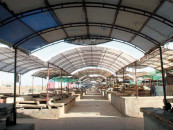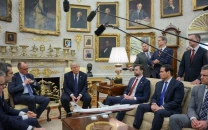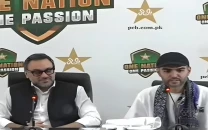Normalising pollution
Discussions on a binding global plastic treaty collapsed thanks to large oil producing nations

Plastic bottles greeted me everywhere I went last week. In the wedding halls of Lahore and Islamabad, the hotel rooms in twin cities, the coffee shops and the restaurants, the living rooms of family and friends. Asking for water now means asking for a plastic water bottle.
The final journey of the empty plastic bottles is also not hard to guess. On one morning around 6am, impacted by a stubborn jet lag, I decided to walk to the only coffee shop that was open near our guest house in Lahore. This was in a rather well to do neighbourhood of the city - one that has ample security personnel that stop you when enter from the main road and stare inside the car and then nod so you can move along. The road I was walking on that morning was largely empty barring a few motorcycles of people going to work, a dozen or so stray dogs that were confused to see someone walking on the road, and an occasional car whose driver also would twist his neck at an awkward angle to stare at me. The road was largely clean, the tall trees that lined the large buildings that could not be seen behind the high walls with barbed wires and big gates were trimmed neatly. By the footpath, however, there were occasional potholes, dug in to fix the cables, or repair something or another. Signs with an apology in high Urdu about the inconvenience caused by the pothole were firmly planted. In every single one of those potholes, regardless of their width or depth, I saw countless plastic water bottles. There was occasionally other trash - wrappers, plastic bags and some pieces of food - but overwhelmingly it was plastic bottles that were filling the holes to the brim. Some seemed like recent arrivals, others were misshapen by the weight of the newcomers and must have been there for quite some time. They were integrated into the mud, gravel, rainwater and other elements of the local environment. At a junction where two of the larger roads met, there were crows and other birds having an early morning snack, in a landscape dotted by transparent vessels that had stored water only once before they were tossed. I have seen much worse in less affluent neighbourhoods where the state's resources are never spent to tidy up the trash.
The issue of plastic pollution is not a benign one. It is one of global importance with extraordinary implications for health. Plastic water bottles are a major contributor of microplastics which have been found in human brains, lungs, kidneys and other organs. They have been linked to serious ailments including cancer. Recent research from my own lab has demonstrated a link between microplastics and drug resistant pathogens. There is ample reason to be concerned that we are just scratching the surface of a very serious problem.
Much is often said about climate change and its impact on health. There are members of the parliament, including ministers, who talk endlessly about why high polluting nations need to pay their share. Indeed, that avenue needs to be pursued and we need to create ways to mitigate and address the problem for everyone. But the environmental problems we see in our midst are not simply because of global climate change, they are also because of attitudes and policies at the local, perhaps even at the individual, level. There is something ironic about ministers talking about environment while sipping water from single-use plastic bottles. The argument that we have to resort to plastic bottles because tap water is not safe to drink is a mere deflection. Indeed, tap water is not safe to drink, and that problem needs to be resolved, but filtered water does not need to be served in single-use plastic bottles. Glassware has been around for quite some time and works quite well.
Last week, the discussions on a binding global plastic treaty collapsed thanks to large oil producing nations. This means for many things to do with plastics, we are on our own for now. We can choose momentary convenience or a healthier future.















COMMENTS
Comments are moderated and generally will be posted if they are on-topic and not abusive.
For more information, please see our Comments FAQ